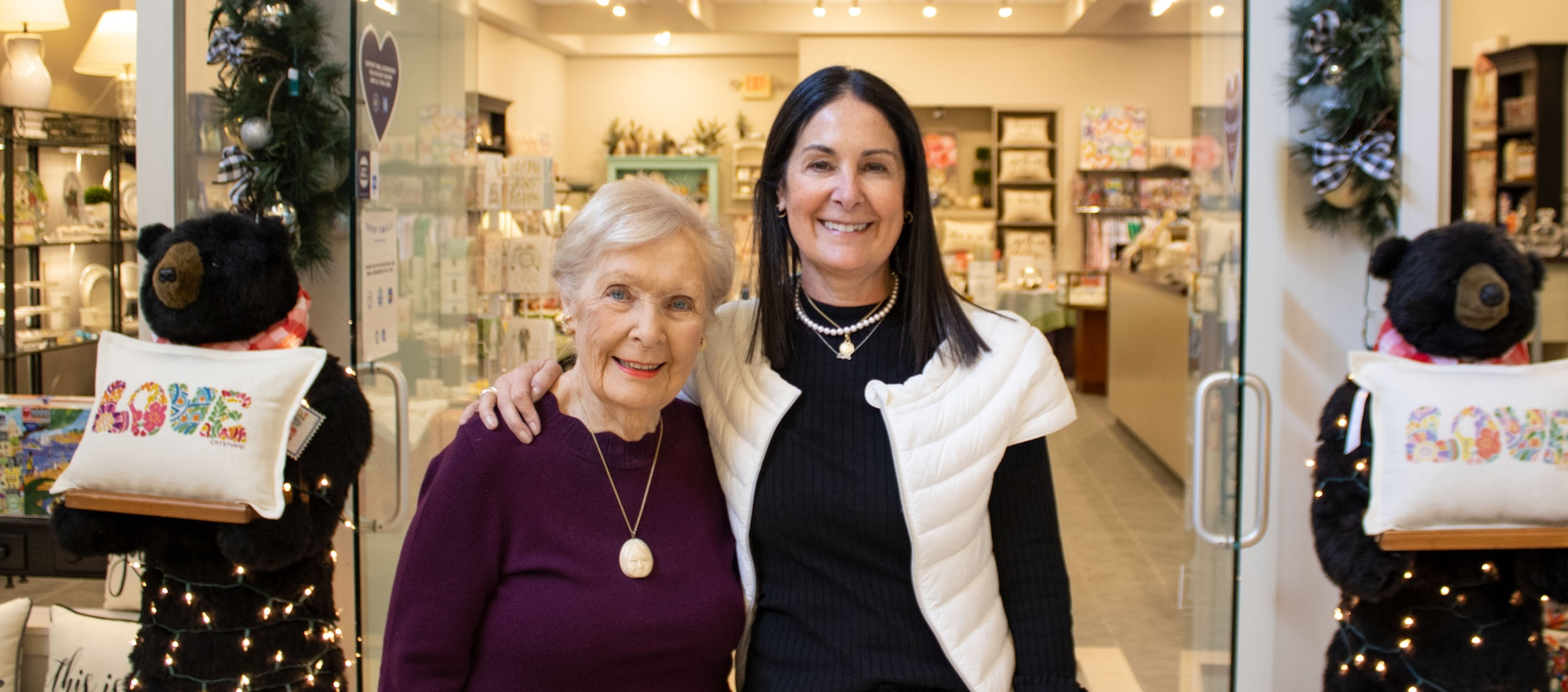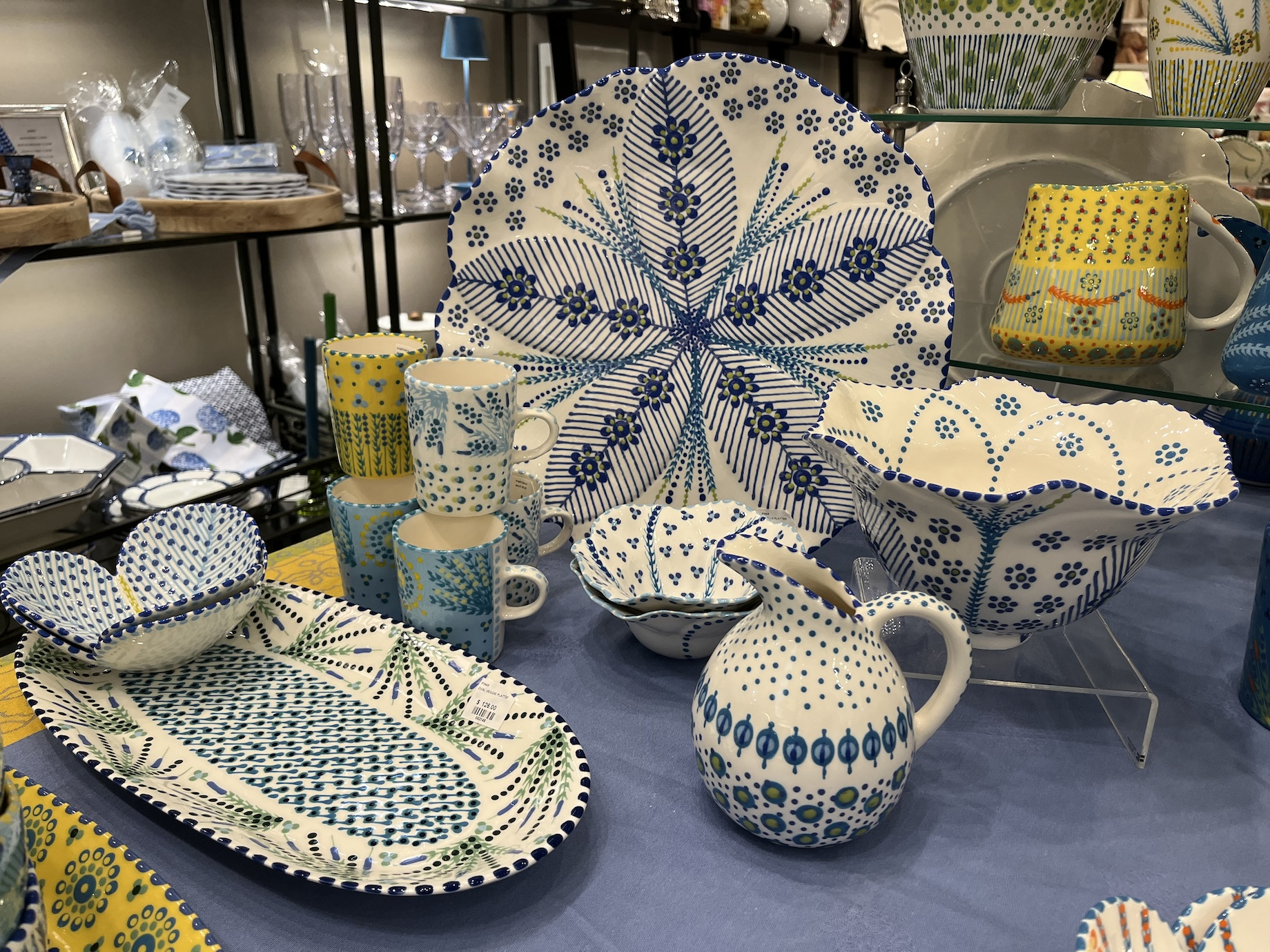Mother-daughter relationships can be fraught enough without running a business together. But Anne Sachs Mulholland and Rita Sachs have managed to make it work for 22 years now. Both had extensive sales backgrounds when, in 2002, the mother and daughter opened a store specializing in unique gifts. The partnership, called Mulholland and Sachs has become the go-to place for specialty gifts and exceptional service. “What we sell is customer service with things attached,” said Rita.

Rita Sachs, left, and Anne Sachs Mulholland, right
Anne had worked in retail “virtually since I was 14,” she said, and majored in fashion merchandising at Ursuline College. But she took time off to be home with her daughter and in the mid-’90s was looking to get back to work. In 1957 in New York City, Rita had worked for Bloomingdales, where she had met her husband Ralph, who is now deceased. Later in Cleveland, she worked in real estate and corporate sales, and she too was looking for a new enterprise.
Anne and Rita spoke with ICSC Small Business Center contributing editor Rebecca Meiser about how they navigate boundaries, make decisions and work through conflict and about the philosophy that has helped them sustain their small business over some rough years.
Working with family can be hard. Did people warn you not to open a store together?
Anne: Actually, people thought it was great because I had worked in retail forever and my mom had been in sales and real estate.
Rita: I had 20 years of selling developments, so I had a huge number of contacts.
Did you always know what type of store you wanted to have?
Anne: We always knew we wanted to carry higher-end gifts.
Rita: But we didn’t want to go into the rarified end. We didn’t want to outprice ourselves. Instead, we said: “What do we want to do with gifts? Who are we targeting?” We decided on celebrations, babies, bar mitzvahs, graduations, showers and weddings all the way up to Granny’s 95th birthday.
Anne: And the lines we brought in weren’t represented or represented well, so we knew we’d have an audience.
What makes you work well together?
Rita: We both thrive on being with people. If you’re in this business and you don’t like working with people, you had best find another field.
Anne: When you’re in customer service — and that’s exactly what we are in because you can buy our product online or you can buy our product 20 minutes down the street [at another store] — people come here for the service and for the friendship. We know the vast majority of our customers. They’re friends to us and family to us. Our similarity is that we enjoy that. We’re also both really focused on the work.
That’s an interesting philosophy, that you see yourselves first as customer service agents rather than as store owners. Is that what you’ve always thought?
Rita: 100%. After 22-plus years, I say that what we sell is a service with things attached. In this era of tortured retail, if you sell service, you probably will do very well because there’s a small slice of the market that still wants service.
Has online shopping affected your business?
Anne: Twenty-two years ago, retail wasn’t the retail of today. Online was barely even a thing. I faxed orders. [Digital sales] have probably hurt us to some degree. It’s so easy to be at home and just order online. But I do think people still want to come in and have service, and a lot of our ladies don’t want to go online and order it. And our community supports local, big time. We have tried to use our platforms like our Instagram page and our advertising to thank people for that. You cannot say goodbye to all of your local retail.
Rita: My desk is at the front door and I hear everyone that comes in. What I hear most as they rush through the door is: “I need to buy a gift and I don’t know what to do.” They know they can come to us.
We talked about similarities. How are you different in the way you approach business?
Anne: I would never be late to anything. She is late to everything. My father taught me if you’re late, you’ve already missed the meeting. If you’re five minutes early, you’re on time.
Rita: She’s very right.
Anne: My mom is way more laid back for sure. I am very much a type-A person. I really don’t like a hair out of place in the store. I want every display to look perfect, every desk perfect. I think that’s probably how we’re most different.
Rita: Oh yeah, I do not do displays. I have no interest in doing displays. I would die if I had to do the displays. So we get along well.

An Anne Sachs-designed display within the Mulholland and Sachs store
Before you opened the store, did you talk about boundaries or how you would maneuver through conflict if it arose?
Anne: I think that with any business but particularly in a family business, you each have your little areas that you’re in charge of. I still do maybe 90% of the buying. You kind of just decide who’s going to do what.
Rita: But it’s loosely defined. We invade each other’s turf all the time. That said, I do all the paperwork. I don’t do the bookkeeping — we have a bookkeeper that comes in — but someone still needs to mind the accounts. And when I’m here, I probably answer 90% of the incoming calls. They might be bridal registries or they might be no-name salesmen, but somebody has to filter out what’s coming in.
How do you manage disagreements in business decisions and philosophies?
Anne: If we have a disagreement about something, we air it. She tells me how she feels, I tell her how I feel and then two minutes later, it’s over. But honestly, 90% of our brain is probably the same in business and we’re fine. But you can’t have another [outside voice] in there, twisting the situation up. You have to communicate. There are no secrets. It’s too small of an environment.
But if there is a real major disagreement on direction, how do you work through it? Is it a 50/50 decision?
Rita, laughing: Well, if I buy something she doesn’t like, she hides it on the floor.
Anne: You have to respect each other’s opinion and say “I don’t agree with what was bought or I don’t agree with this decision or this ad or whatever,” but you just have to move on. You can’t dwell. It’s too close of an environment. In a family business, you cannot stew. You cannot stay mad. You just have to say: “all right, that’s the decision that was made.” Though big decisions are not made that way.
Talk more about that.
Rita: We want [the store] to be successful. We want to buy things that the market wants, so it’s our mutual job to be sure that we buy it correctly and present it correctly.
Anne: For big decisions like maybe bringing in a big new line, we talk about it. I might show it to [my mom] and say: “This is what I’m thinking. This is what the dollar volume would cost. This is the space we’re going to put it in. What do you think? Do we have a market for it?”
Rita: Yes, it’s a big deal to bring in a new line. We need to, first of all, make sure we have physical room for it.
Anne: Right, because then you’re going to have to get rid of something. Like if I wanted to bring in a gorgeous new candle line that might cost $10,000 wholesale, I may have to say goodbye to something. So we have to talk about that.
Rita: There are lots of beautiful things that we just don’t physically have room for. We have to be realistic.
Do you trust each other’s instincts?
Anne: For sure. As far as our tastes and our ideas, we bounce off each other very well. There may be moments during the year that we each bring something in that the other says “My God, what are you doing?” but that’s so minuscule.
Anne, does your daughter have any interest in retail or taking over the business?
My daughter is a cardiac ICU nurse in Beverly Hills. She could run the store if I was not here. She grew up in the store since she was 8 years old. But she’s watched what I’ve done, and her father works for Arhaus furniture and has always worked in luxury like Louis Vuitton and Prada and she’s watched him, too. She said: “I will never do what the two of you do because you have no life.” Right now, she’s sitting at the beach in Santa Monica reading a book.
What advice would you give to entrepreneurs thinking of going into business with their family members?
Anne: It’s not easy. It’s not for everybody. You have to be able to get along. You have to be able to bounce ideas off each other, respect each other and not be insulted and stop speaking for days. It won’t work if you do that.
Where do you want to be in the future?
Anne: Well, Rita is 89. That’s not a young spring chicken, so I just don’t know. We love what we do. We’re in a phenomenal location. I have a wonderful staff. I have a great product. I have a great partner. So right now, we’re just really taking things day by day.
By Rebecca Meiser
Contributor, Commerce + Communities Today and Small Business Center